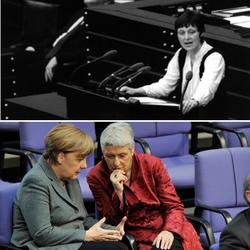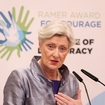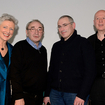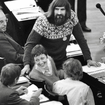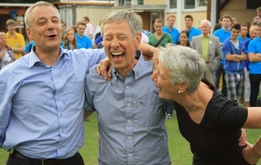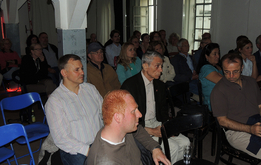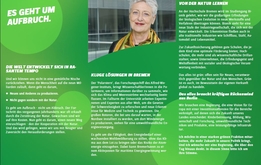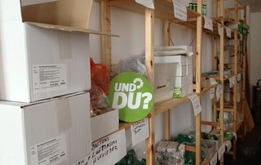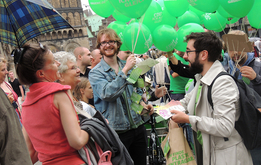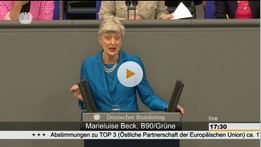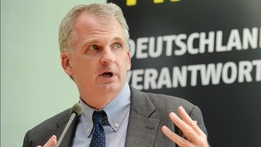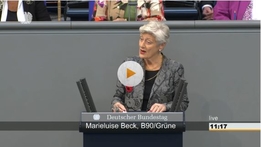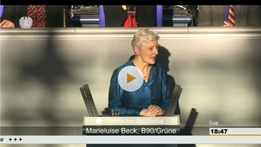My journey with the Greens – a political review.
Dear Bremen Greens,
My personal journey with the Greens began with an encounter with a Holocaust survivor 36 years ago. At the time, I was a young teacher in Baden-Württemberg and a volunteer with a psychosocial counselling centre, and wanted nothing to do with politics. But meeting Heinz Brandt took me in a different direction. Having suffered both the terror of the Nazis and the authoritarianism of the GDR, he showed me that there was nothing honourable about staying out of politics. So I joined the newly founded Green Party – even though the notion of a ‘party’ still worried me a little on account of its historical connotations. Within four months, I became the spokesperson for the Baden-Württemberg Greens, having been ‘discovered’, incidentally, by Winfried Kretschmann, who felt that I had something of a talent for politics.
From pacifism to the Responsibility to Protect
The early 1980s were dominated by the debate about nuclear weapons in Europe, particularly the stationing of US Pershing II missiles
to counter the Soviets’ medium-range SS-20s. We resisted this latest twist in the nuclear arms race with all our energy. I was absolutely convinced that unilateral disarmament and ‘no more war’ were the only morally defensible response after the crimes and cataclysms of the 20th century. I also believed that it was better, in every case, to dispense with a military defence against a potential aggressor – non-violent resistance was the only way to save lives.
It was only many years later, when I was touched by the wars in the disintegrating Yugoslavia and visited Bosnia many, many times, that my perspective changed. For the first time in my life, I learned to recognise the sound of artillery fire as I sat in Zenica’s basements with people gripped by fear that the defences around the city would not hold. The Bosnian Muslims knew that if the Chetniks broke through, this would mean expulsion and death – and, for the women, the threat of sexual violence. This different perspective turned my ideas on their head. During those wars, it was the victims who rightly asked why we were not protecting them. And once again, it was a Jewish voice – in this case, the voice of the heart surgeon and Warsaw Ghetto survivor Marek Edelman – who urged the world not to stand by and watch the killing in Bosnia any longer. I joined a small group of like-minded people who supported this view, and remember only too well that this position was regarded as an outrage by many in the Green Party. This focus on the victims was our constant refrain over subsequent years, not only in Bosnia, where the catastrophe of Srebrenica taught us that the unthinkable was still possible – a genocide in the heart of Europe just 50 years after the end of the Second World War.
During that time, many people in Bremen did whatever they could to help the suffering people of Bosnia. The cities of Tuzla and Lukavac were not as well-known as Sarajevo, but they too were cut off from all supplies for months at a time. The first convoy, carrying 180 tonnes of flour, sugar and oil, to finally reach these two cities after eight months of siege came from our association ‘Brücke der Hoffnung’ – Bridge of Hope, from our city. Lukavac now has a Bremen Square as the city’s expression of thanks.
Focusing on the victims always means campaigning for human rights as well: for freedom, for security, for minorities’ rights to protection and equality, for the right to diversity, for the right to be different. This human rights policy is one of the Greens’ strongest pillars. And of course, it also includes environmental and social rights: the right to clean water, to healthy food, to education and health care.
From ‘foreigners’ issues’ to immigration policy
Under the Red-Green Government, I was the first Green Commissioner for Foreigners’ Issues – a role which we recast as the Federal Government Commissioner for Migration, Refugees and Integration – and helped to shape the debate about Germany as an immigration country. It was often an uphill struggle. The conservatives steadfastly refused to accept what had long been the reality, namely that Germany was an immigration country, with all the new challenges that this created. Our position came under vigorous attack and the mood was inflammatory, especially when Germany began to discuss issues such as dual citizenship and the wearing of the headscarf. At that time, it was not yet technically possible to insult others and even issue death threats with a click of the mouse. Instead, the insults and threats came on postcards or in phone calls. My assistant at the time made many of these messages disappear before I ever got to see them, a kindness for which I am grateful to this day.
Ending the division of Europe
After the Greens lost their place in Germany’s coalition government, the third phase of my work dealt with policy in and for Eastern Europe. I would never have gained such a rapid understanding of the profound extent of Europe’s division – agreed at the Crimea Conference in 1945 – were it not for the magnificent efforts of the Heinrich Böll Foundation, which established an excellent network of civil rights activists, environmentalists, critical journalists and women’s rights campaigners in most of the Central and Eastern European countries. The historical responsibility for this region of Europe, so long cut off from democracy and human rights, is, I firmly believe, still one of the Greens’ foremost tasks. Anyone wishing to understand Eastern Europe should not focus solely on Putin and the Kremlin. They should listen to people like Arseny Roginsky from the Russian
civil rights society Memorial, who was sent to the gulag for his historical research on the Stalinist period. They should encounter Lyudmila Alexeyeva, who – under the protection of the Helsinki Agreements – began to rally a fledgling civil rights movement. They should know that in Belarus, one in four civilians died at the hands of the SS and the Wehrmacht, and that there were once Jewish communities along the Neman River. They should be aware that Ukraine was one of the main territories on which the Wehrmacht conducted its war of annihilation, and that this was where the German Reich recruited most of its forced labourers from the Soviet population, deporting them to Germany in their millions. And, of course, they should know that all these places formed the backdrop to the Shoah.
A Green should also know that the invasion of Poland in 1939 was preceded by a shameful pact between Hitler and Stalin on the carve-up of the Baltic countries, Poland and Bessarabia, which remained in place until 1941, ruthlessly subjecting the people in these countries to the brown and red terror. Cities such as Kharkiv, Dnipropetrovsk and Odessa have large Jewish communities still – or again. The intelligentsia in Russia, but also in Ukraine, is mostly Jewish. One of them is Alexey Botvinov, the brilliant pianist from Odessa, with whom we spanned the musical arc between Bremen and Odessa.
Bremen: buten un binnen [In and out]
For me, politics always means people. I am aware of the rumour that is being spread about me – that I have not done enough to promote Bremen’s interests. In fact, during my time as a Member of Parliament, I have built up a range of contacts with the city and have formed relationships which endure to this day. They include links with a number of schools that have signed up to the Schools against Racism campaign: I am their project patron. There is the arts centre, Kulturladen Huchting, which has been so supportive of my work. There are the social workers at VAJA, who are committed to delivering youth outreach services; the self-confident women at Quirl; the training centres for marginalised young people; the beekeepers from Oberneuland; the gospel and hip hop communities from Bremerhaven; the boxing club for young migrants; the churches’ outreach for women; the Cathedral Choir, now performing as the RathsChor; and there is also the big table at Wernigeroder Straße 10, where people from all over the city and from many different backgrounds come together – more than 2,500 of them, in fact, have visited Beck@Home in recent years. The discussions were open-ended and intense and dealt with controversial issues. No topics were off-limits, and I was always happy to see that at the end of the evening, even after three or four hours, there would still be small groups of people standing on the sidewalk and continuing the debate. I always saw this as being part of my work for the party – for committees and official structures are all well and good, but reaching out to the people around us is what the party is really about.
Over the years, my small team and I have involved a great many leading figures in the political debate in Bremen. We organised events on a wide range of issues: the right to die with dignity, hydrogen-powered aircraft, stem cells, data protection, railway noise pollution, women’s issues, nuclear disasters, and the crossover between the ultra right and progressive politics (Querfront). We discussed events in Darfur, Tunisia, Afghanistan, Pakistan, Iran, the Balkans and Eastern Europe. We embraced creative formats: we read political biographies and political noir in the living room, watched films and attended concerts, large and small. Even the music we listened to struck a political note: from hip hop in Xhosa and Russian punk to the works of Odessa-based composers Silvestrov, Freidlin and Karamanov.
I am grateful that with your trust and support over so many years, I had the opportunity to follow my beliefs, to meet with others who shared my views and thus forge friendships and justify the hopes that I have always invested in the Green Party. In some cases, we were even able to offer protection – a small gesture, given the amount of suffering there is in the world, but it made all the difference to the recipients.
They included imprisoned members of the opposition in Belarus, whom I sponsored in order to improve their conditions of detention and ensure they were not forgotten. All of them, I am happy to say, have now been freed. Some of you may know about the Lebanese single mother and her seven children whom we have been assisting for 13 years, or about the three children in Iraq and their desperate seven-year campaign to be reunited with their parents who had fled to Bremen, or little Faris, abducted by his father and taken to Tunisia, who, I am pleased to say, was finally returned to his mother in Findorff after our determined intervention.
Green means taking sides
Today, 36 years after joining the party, I know that awareness of the annihilation of Jewish life in Europe is the seedbed that nurtures my thinking and actions. I am filled with gratitude for the strength that I gained from knowing Juri Elperin, who was displaced from Berlin, later moved to Russia and finally returned to Berlin in the last years of his life.
For me, Green politics always meant not staying cocooned within our own circle but reaching out to wider society. And it meant taking sides for the victims of injustice and violence. The Nobel Prize Laureate Elie Wiesel, who died not long ago, sent a very clear message to those of us who were born afterwards: “We must always take sides. Neutrality helps the oppressor, never the victim. Silence encourages the tormentor, never the tormented.” That means dispensing with impartiality. It means taking sides against the crimes committed even by the established democracies: Abu Ghraib, Guantanamo, the intervention in Iraq based on false intelligence. It means standing with the people of Afghanistan who are being terrorised by the Taliban. It means defending the right of Israelis and Palestinians alike to live in safe borders. It means standing firm against violence and impunity in Chechnya. Natalya Estemirova, whom I knew well, was just one of those who did so: she paid for her courage with her life. It means taking sides against authoritarian regimes. As a Member of the Parliamentary Assembly of the Council of Europe, I have pushed through critical reports and resolutions, despite opposition, in order to support the democratic movements in Eastern Europe. These documents are an important frame of reference that civil rights activists can invoke in their dealings with governments. And it means taking sides when the European peace order is lifted off its hinges by Russian aggression against Ukraine.
With this position, I have often encountered incomprehension and even opposition from some of you. But conflict, if dealt with openly, can be productive. With my positions, I have always regarded myself as an authentic Bremen Green – for as befits a cosmopolitan Hanseatic city, Bremen has always understood that the fates of others elsewhere are our concern as well. Hans Koschnik showed us how well this reflects on our city of Bremen, one of Germany’s smallest states.
A new chapter
It is no secret that I would like to continue my work as a Member of Parliament in the same vein. I am not yet past my prime; on the contrary, I still have a lot to give. Many of those with whom I have built up a close working relationship over the years are very much hoping that this will continue. However, I also recognise that some sections of the party in Bremen think it is time for a change. After so many years of active commitment to Green politics, I do not wish to stand again against key figures in Bremen’s Green establishment.
So it is time for a parting of the ways: rather than stand as a candidate for Bremen, I plan to explore new avenues, guided by the compass that has shaped my political life.
